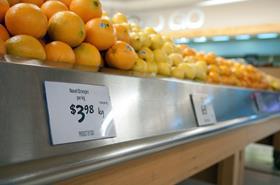
The Overseas Pre-clearance Inspection (OPI) scheme, offered through Australia’s Department of Agriculture and Water Resources (DAWR) since 2001, is about to disappear.
The government department made a decision to eliminate the program in 2016 meaning importers will have to inspect and clear fruit for arrival onshore in Australia.
Previously, Australia appointed inspectors who travel to selected ports overseas to pre-clear produce as it meets phytosanitary approvals. Now, the number of inspectors is being reduced and moved back home.
A spokesperson from the DAWR told Asiafruit that the program is being phased out because on-arrival inspection provides greater opportunities for the DAWR to drive compliance and better allocate resources according to biosecurity risk.
Industry representatives are not convinced.
A member of the Australian Horticultural Exporters and Importers Association (AHEIA) told Asiafruit that wait times for onshore clearance are sitting at around 7 or 8 days, adding an extra week to their pre-order schedule.
“The retailers don’t want to hear ‘I’m sorry but we can’t get an inspection for your program,’” they said.
Industry sources told Asiafruit that Australia’s import sector is not only concerned about their business and relationships, but the flow-on effect for export deals.
“We know that in the past several of our neighbours have used non-phytosanitary issues to restrict fruit imports,” said Neil Barker, CEO at BGP International. “When they see how effective the DAWR protectionist policy has been I have no doubt they will consider adopting the policy. If an Australian grape shipment to Jakarta airport regularly spent seven days in the cargo terminal waiting for an inspection my guess is that the trade would stop.”
Dominic Jenkin, CEO of the AHEIA explained that when inspectors are placed overseas they’re able to approve produce more efficiently as multiple orders might be stationed in a single location at a major port; last year the programme operated across 75,000 tonnes of fresh fruit imports from New Zealand and the US.
The program was offered to a handful of countries, which has dwindled over the years. Currently availability is only for the USA and New Zealand on selected fruit and veg.
The DAWR said that the removal of OPI does not impact on the number of inspectors available to the department.
However, in Australia, inspectors are having to travel much longer distances between warehouses to inspect and approve. Because of the delays, importers are also having to absorb the cost and losses from shortened shelf life and storage fees to hold sealed containers while they wait for a scheduled inspector.
To curb the problem, the DAWR decided to implement a Compliance-Based Inspection (CBI) scheme last year, which was piloted during the New Zealand avocado season.
The CBI scheme means that if a product reaches a certain number of approved inspections (for avocados it’s five in a row), they will then move to a reduced inspection rate (again for avocados, inspections will reduce to one in four shipments).
“The new scheme was intended to reward importers who could achieve a good compliance history with decreased inspection rates and faster entry. To date, no importers have achieved these reduced inspection rates,” New Zealand Avocados told Asiafruit in a statement.
“An overriding reason is the difficulty of accurately identifying often globally distributed organisms (and their eggs), down to a taxonomic level to confirm they are not of quarantine concern,” they said.
The same issue appeared in 2016 when lemons and limes from the US were subject to the trial and saw backlogs of up to ten days.
While experiencing setbacks in gaining approval, a lot of the annoyance over changes stems from the where funding of the inspection program comes from.
“The frustrating thing is that it’s industry funded. So, most of the time the limitation is cost for government processes, but this is definitely not a case of that. The industry has never said ‘we’re not willing to pay for this,’” said the anonymous AHEIA member.
The DAWR sad it’s working closely with industry and trading partners to optimise compliance and minimise any disruption, while facilitating safe trade.






No comments yet